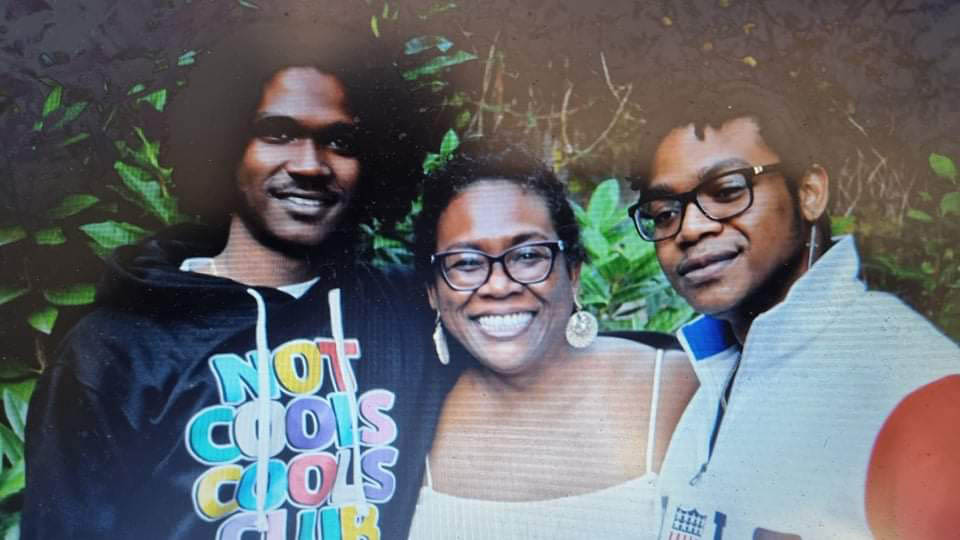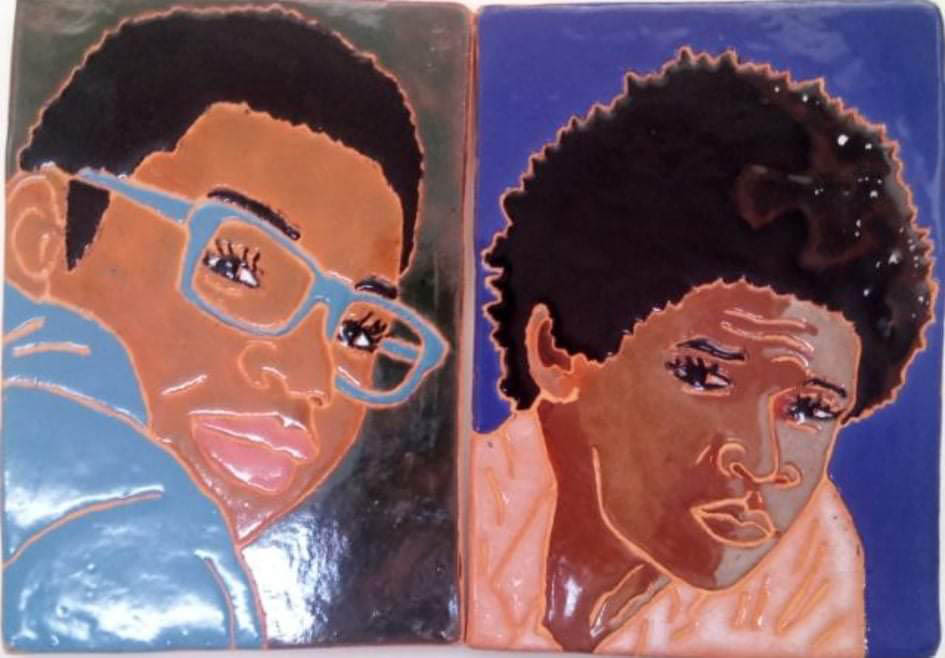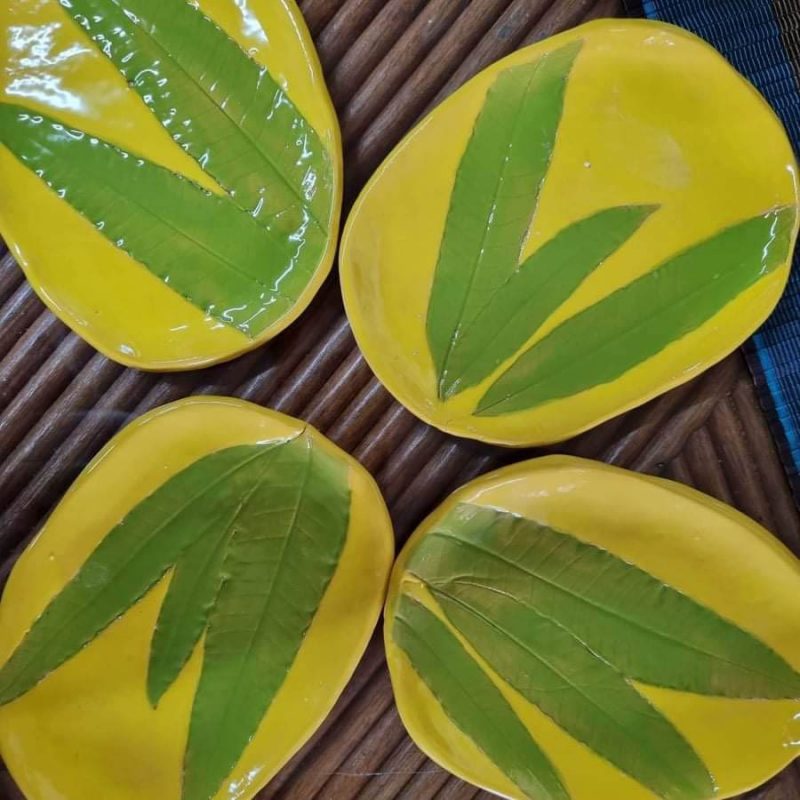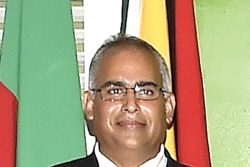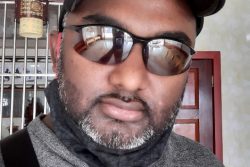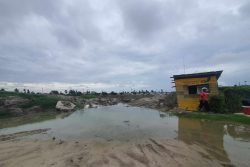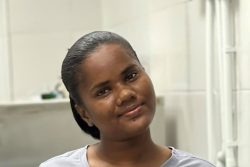Growing up with two matriarchs in the home taught Lisa Thompson, 53, a counsellor, social worker, researcher, administrator and artist, the value of being independent through education, acquiring a life skill and of integrity in spite of many of life’s challenges.
“My three siblings and I grew up very close, learning household chores together. We were poor and content, but we didn’t know we were poor until we travelled. I had a happy childhood in spite of my father who was violent and who used to stalk and threaten my mother’s life,” Thompson said.
Her parents divorced when she was eight years old. She grew up at Adventure, Essequibo Coast with her mother Lynette Ho-Shing Sylvester and grandmother Clarice Myers, who made Thompson and her siblings feel loved, safe and secure. “They believed and I believe, we should strive to live with integrity because our lives influence and inform children and people in general,” she noted.
Thompson walked from Adventure to Suddie to attend primary school, which she said, “was no big deal because other kids walked too.”
When her mother went to Louisiana, USA on a scholarship, Thompson and her siblings were left with their grandmother, and when funds were low, her older brother would go fishing. They would pick eddo leaves and whatever crops were in their yard to cook.
“My grandmother made everything fun. That helped to shape how I looked at things growing up and how I look at things now,” she said. “I don’t want to discredit people who live in poverty but I do know what it means to go to school in rubber slippers.”
When her mother returned from overseas, she was appointed an education officer and their standard of living improved.
After a successful sitting of the Caribbean Secondary Education Certificate examinations at Anna Regina Multilateral School, Thompson, then 16 years old, taught at Cotton Field Nursery as a temporary unqualified mistress. When her mother was appointed principal of Carnegie School of Home Economics the family moved to Georgetown and Thompson joined the Guyana Chronicle where she worked as a reporter for five years before moving to Canada with her family.
She pursued a bachelor’s degree in social work at the University of Victoria on Vancouver Island. During that time her mother and grandmother died within a year. She and her siblings had to earn their living.
“That’s how I got into working with addicts, alcoholics and women and children who were abused at several private treatment facilities and government funded homes,” she said.
Eventually, she returned to Guyana and got married.
Her first job after marriage was with the non-governmental organisation Help and Shelter as a professional counsellor. “That was influenced by my mother’s experience and my work in Canada. Working with women and children to address those issues in a positive way inspired and helped me to be a better mother and a better partner ultimately,” she noted. “I am passionate about children being nurtured in an environment that allows them to recognize and celebrate their worth so that young girls and young boys can feel that sense of self in a positive way. Then they can grow up to be productive adults who can live their lives in a way that reflects kindness, integrity and genuineness and caring not just about themselves but about others too.”
At Help and Shelter, she went to court with women and children who were victims or survivors of violence and abuse. A case that stood out, involved the wife of a member of the judiciary. The wife, who suffered beatings that resulted in bruises, swellings and emotional trauma, was fearful that the justice system would not work for her.
“As a counsellor I went to court with women who were experiencing tremendous amounts of emotional abuse but who were still functioning in their workplaces and taking care of their responsibilities,” she recalled. “I provided counselling and helped them to get to where they acknowledged what they needed to do to escape the abusive environment. It was incredibly rewarding when they moved from one step to the next and got to a point where they actually fulfilled their full potential and lived their lives free from abuse.”
When Help and Shelter decided it was going to deal with the perpetrators of violence, Thompson said she recognised her limitations when one of them told her that the devil made him abuse his 11-year-old daughter. “I didn’t feel equipped to deal with male perpetrators of violence against women. It took me back to a lesson I learned from my mother and grandmother – that it is important that you recognise your own limitations, especially when you have someone’s life in your hands and you can influence the outcomes, and recognising when you can do harm and ensuring that you do no harm,” she said.
Another scenario that caused her concern was parents who accepted money from people who abused their children. “The children are often left believing there is a monetary worth on their virginity, or that their bodies are for sale by their parents,” she said.
Feeling burnt out from counselling and still with Help and Shelter, Thompson began training volunteer counsellors, police officers, healthcare providers, social workers, teachers and a wide cross-section of workers. “Once, during a training session at Mabaruma a young soldier told me that if I was his wife he would hit me,” Thompson recalled. “He didn’t like that I was against women or men not being hit to deal with conflict and that there are other ways to deal with it.”
While at Help and Shelter, she collaborated with the Canadian International Development Agency on matters of democracy and governance that took her across the country to work with hinterland communities, predominantly among Indigenous women, to help themunderstand their rights, due process, and involvement in decision-making at the community level in a build up to add their voices at the regional and national levels.
In 2003 and after six years at Help and Shelter, Thompson moved back to Canada where she worked for a year with street-involved youths. “The outfit where I worked tried to reintegrate them into a home setting,” she said.
She returned to Guyana in 2005 and worked for a year with UNICEF on a situational analysis on children who were orphaned or made vulnerable because of HIV/AIDS.
She then worked initially as a technical trainer with Family Health International (FHI) to train healthcare providers in the prevention of mother-to-child transmission of HIV. “A team of us did various aspects of training as part of a one-year pilot,” she recalled. The project was then extended to four years. For two years Thompson functioned as a technical officer for orphans and vulnerable children (OVC) which led her to work with civil society organisations, labour unions and healthcare providers.
“I then became a senior programme officer at the management level helping with the project under a country director. When he left, I stepped into the role of acting chief of party for that project and closed it out,” she said.
She then returned to UNICEF as health officer and worked in collaboration with the Maternal and Child Health Division, Ministry of Health to help strengthen health centres.
In 2010, her young family moved to Barbados as her husband had obtained a job there. By this time she had two children.
In Barbados, she joined a regional programme under the President’s Emergency Fund for AIDS Relief (PEPFAR) as a senior programme officer with the US Embassy.
“I contributed to what was happening in 14 different Caribbean countries. It was a lot of travel and exciting. We were funding programmes not just at the governmental level but supporting civil society organisations at the community level. I got to work at the management and implementation levels,” she said.
Three years into the programme, the regional coordinator left and she acted in the position for two years, leading that programme and coordinating the activities of six US government agencies including the Department of Defense, USAID, Centers for Disease Control and the State Department. “These agencies supported the specific needs of each of those countries while satisfying the US mandate under the PEPFAR programme,” she noted.
Thompson and her family moved back to Guyana at the end of 2016. She then headed the USAID HIV project: Advancing Partners and Communities. “That took me back to working with and supporting civil society organisations until we wound down to just supporting Artistes in Direct Support and Guyana Trans United where we implemented the programmes that were predominantly for the key populations that were most affected by HIV in Guyana,” she said.
When that ended in 2019, she worked for the Justice Education Society of British Columbia, which was winding down a project with the police and the judiciary to build their capacity. After that she did consultancy with USAID in Jamaica to support civil society organisations in strengthening their capacity on health related issues, to manage larger blocks of funding in support of government programmes and being guided by the policies of the Jamaican government.
She then took a break and is now set to start a new assignment in the local legal sector.
Thompson is a volunteer on a literacy programme for children in protective custody with the Rotary Club of Georgetown. It is a collaborative project with the Ministry of Human Services and Social Security.
Art
While she has had a hectic work schedule, Thompson became involved in mosaic art early in her working career. She is now into pottery. With two young children in tow, it was work and school, and swimming, karate or piano training sessions. “Once we got home in the evenings it was family time. Once the children settled down I would work in the garage on my art until 10 o’clock or whenever,” she said. “I always carved out time for my art because it was an important part of how I balance my life.”
Thompson, who is mostly self-taught, said that with her sons now abroad, she has a lot of time to improve her skills. “Now that I am going to work full time, my art is going to be part time again,” she said.
Mosaic was a challenging pursuit to her because she knew nothing about it. “I just thought you could create incredibly beautiful pieces if you learned how to do this thing,” she said. She recalled that while fashioning her craft she met Elizabeth ‘Liz’ Hughes who ran the Calabash Gift Shoppe and the Hadfield Foundation which had an art gallery. Hughes encouraged her to stage an exhibition of her work. She successfully exhibited her mosaic work under the title, ‘A Little Bit of Mauby’ and subsequently staged a second exhibition, ‘It’s all about Music and Lights’ in which she featured a mix of mosaic table tops and stained glass.
While in Barbados, she never felt the urge to do any art and when she returned to Guyana she was still not inspired. When she was stuck in Canada at the start of the COVID-19 pandemic, she expressed a desire to do pottery to a friend. Her friend’s mother-in-law was a potter. From her, she learnt the basics, including how to use the potter’s wheel, how to treat clay, how to glaze and tips about firing in a kiln.
She obtained a kiln and a potter’s wheel and continued to learn with the help of local potter Nicholas Young, who taught her the process of treating raw clay. “That is how the pottery thing, which I absolutely love, took off,” she said. “It’s not something I can get up to every morning. The ideas just come and when they come I work until I’m exhausted.”
When businesswoman Diane Chin held a Farmers Market Hughes again suggested to Thompson that she exhibit her pottery. “I didn’t think my work was good enough,” she said. “Liz looked at them and said they were gorgeous.” Though not confident, Thompson registered for one day, but Chin reserved a space for her for subsequent market days and she was thankful.
“They just flew off the table. I think it is because my work is representative of Guyana’s flora and fauna. The style of other potters, who are a lot more experienced than me and do incredible work, is totally different from mine. I work with a lot of glazes on tiles and portraits. My work is vibrant and colourful. I like to think it is reflective of my outlook on life as well,” she said.
Thompson has a Facebook page for her work: Scarlet Ibis Pottery.
In her personal life, Thompson said, she is fortunate to be the mother of two fearless young men, Benjamin and Shamane. They represented Guyana in swimming and karate; represented Barbados and their universities in squash, and Benjamin at university in both squash and badminton. Both have several titles in Barbados with Shamane holding five Caribbean titles: one under-15, two under-17 and two under-19.
They obtained scholarships at Avon Old Farms Boarding School for Boys in Connecticut where they played varsity squash. When Thompson was undecided about them taking up the offers, they assured her that they would be fine. “Now, when I feel unsure of myself and what I am doing they remind me always what I am capable of,” she said.
And while her life may seem full of travel and adventure, Thompson said she experienced many setbacks throughout but never gave up. “I am not a church-going person but I believe in God and that He/She looks out for me in the best and worst times,” she said. “I believe that if you are good in your heart and if your intentions are pure, this universe will always have your back, like it has mine.”

